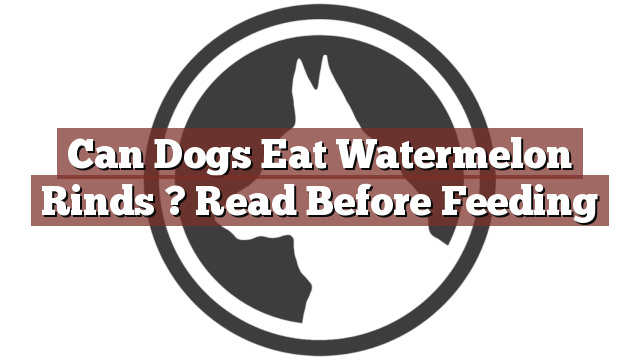Understanding Your Dog’s Dietary Needs
As a responsible pet owner, it is essential to understand your dog’s dietary needs in order to provide them with a balanced and nutritious diet. Dogs have different digestive systems and nutritional requirements than humans, so it is crucial to be aware of what foods are safe for them to consume. While dogs primarily thrive on a diet of meat, they can also benefit from certain fruits and vegetables as a supplement to their regular meals.
Can Dogs Eat Watermelon Rinds? Read Before Feeding
Can dogs eat watermelon rinds? This is a common question that dog owners often ask. The answer is no – dogs should not consume watermelon rinds. While the flesh of the watermelon is safe for dogs to eat in moderation, the rinds can be difficult for them to digest and may cause gastrointestinal issues. Watermelon rinds are tough and fibrous, making them a potential choking hazard or causing blockages in your dog’s digestive tract.
Pros and Cons of Feeding Watermelon Rinds to Dogs
Feeding watermelon rinds to dogs may have some potential benefits, but the risks outweigh the advantages. On the positive side, watermelon rinds are low in calories and fat, making them a healthy snack option. They also contain vitamins A and C, which can support your dog’s immune system. Additionally, the rinds have a high water content, which can help keep your dog hydrated on hot summer days.
However, it is important to note that the cons of feeding watermelon rinds to dogs outweigh the potential benefits. Dogs may struggle to chew and digest the tough rinds, leading to gastrointestinal upset such as diarrhea or vomiting. The fibrous nature of the rinds can also pose a choking hazard or cause blockages in your dog’s digestive system, which may require surgical intervention. Therefore, it is safest to avoid feeding watermelon rinds to your furry friend.
Conclusion: Considerations Before Offering Watermelon Rinds to Your Dog
In conclusion, while watermelon is a refreshing and nutritious fruit for humans, it is important to exercise caution when sharing it with your dog. Can dogs eat watermelon rinds? No. Although the flesh of the watermelon is generally safe for dogs in moderation, the rinds can be challenging for them to digest and may pose a health risk. If you want to treat your dog to a watermelon snack, make sure to remove the rinds and seeds entirely, and feed them small, bite-sized pieces of the flesh. As always, it is recommended to consult with your veterinarian before introducing any new foods into your dog’s diet to ensure their safety and well-being.
Thank you for taking the time to read through our exploration of [page_title]. As every dog lover knows, our furry friends have unique dietary needs and responses, often varying from one canine to another. This is why it's paramount to approach any changes in their diet with caution and knowledge.
Before introducing any new treats or making alterations to your dog's diet based on our insights, it's crucial to consult with a veterinarian about [page_title]. Their expertise ensures that the choices you make are well-suited to your particular pet's health and well-being.
Even seemingly harmless foods can sometimes lead to allergic reactions or digestive issues, which is why monitoring your dog after introducing any new food item is essential.
The content provided here on [page_title] is crafted with care, thorough research, and a genuine love for dogs. Nevertheless, it serves as a general guideline and should not be considered a substitute for professional veterinary advice.
Always prioritize the expert insights of your veterinarian, and remember that the health and happiness of your furry companion come first.
May your journey with your pet continue to be filled with joy, love, and safe culinary adventures. Happy reading, and even happier snacking for your canine friend!

